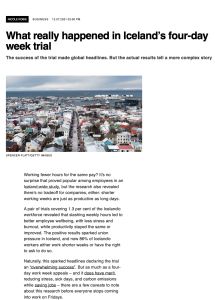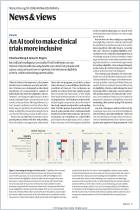Join getAbstract to access the summary!

Join getAbstract to access the summary!
Nicole Kobie
What Really Happened in Iceland’s Four-Day Week Trial
The success of the trial made global headlines. But the actual results tell a more complex story
Wired, 2021
What's inside?
Learn the facts behind the celebrated Iceland study of reduced working hours.
1×
Log in to listen to the audio summary.
Recommendation
The reports out of Iceland sound too good to be true: Reduced working hours make workers happier and don’t harm productivity? To find out whether these revolutionary results hold water, journalist Nicole Kobie delves into the research findings from Iceland’s pioneering experiment with shorter workweeks. The results may inspire your company to radically re-evaluate its work-time arrangement.
Summary
About the Author
Nicole Kobie is a contributing editor for Wired.
Learners who read this summary also read
Article
Book
Book
















Comment on this summary